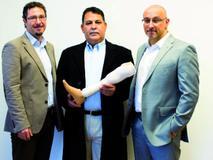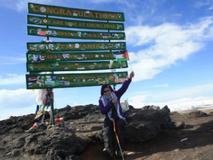«Walking is a basic human right that should be affordable to everyone everywhere»
21.03.2014
SwissLeg was created in September 2012 by Paulo Gonçalves, Mohammad Ismail and Roberto Agosta. The startup, based in Lugano, strives to bring the cost of high mobility prosthetics down to the price of a good pair of shoes. Now we had the chance to talk to Paulo Gonçalves about their projects and his time in Boston as a captain of the Swiss national startup team.
 Founders of SwissLeg Roberto Agosta, Mohammad Ismail and Paulo Gonçalves
|
 Yasmeen arrived the top of the Kilimanjaro
|
Dear Paulo, you just came back from Jordan. Please tell us about your experience with the Syrian refugees and how you can help there?
«SwissLeg has an orthopedic production and training center in Irbid, close to the Syrian border in the North of Jordan, where amputees can receive a SwissLeg prosthesis and relearn to walk. The clinic provides low-cost, high mobility prostheses. In addition to patients, we also get visits from a number of Humanitarian Organizations (HOs) like Handicap International, Médecins Sans Frontières (MSF), International Committee of the Red Cross (ICRC), among others. At the moment, we have an ongoing cooperation with the Syrian Commission of Refugees, providing assistance to Syrian refugees in Jordan. We are also engaging in a new partnership with the International Organization for Migration (IOM) Mission in Syria to treat 50 children and young adults in Damascus. This pilot program ends in March and if successful, we will start a long term collaboration treating around 100 patients per month.»
For the first time in history, two amputee teenagers from the Middle East climbed Africa’s highest peak, the Kilimanjaro to inspire kids all over the world that they can do whatever they set their minds, too. One of them, Yasmeen, fitted with a SwissLeg prosthesis. It`s an amazing story. Could you tell us what happened to Yasmeen and how you got in contact with her?
«Yasmeen is a 17 year-old Palestinian girl, who lost her leg when she was only three years old in an accident. We got in contact with her through the Palestine Children's Relief Fund and their “climb of hope” program. Her prosthesis was not working well and she really required a new one. Everything was very last minute, but Mohammad Ismail, our Chief Technology Officer (CTO) was able to return from Sudan in time to fit Yasmeen with an above knee (AK) SwissLeg prosthesis in less than 1 ½ day. We are very proud that she was able to reach the top of the Kilimanjaro on January 24th. The fact that SwissLeg was able to help her physically to get to the top of Kilimanjaro and financially to support the plight of Arab amputees was absolutely great for us.»
You were venture leaders captain of the Swiss national startup team in Boston last year. How was your time in the U.S.?
«First of all, it was an absolutely honor to be in the venture leaders team. The team had twenty smart, driven, well prepared and willing to learn entrepreneurs. It was an honor and a privilege to be among them. Also it was a great opportunity to meet like-minded people in the U.S. such as entrepreneurs, venture capitalists, innovators and enthusiasts. I personally got exposed to a diversity of perspectives and insights through the one-on-one coaching and workshops, so it was a lot of learning in a very short amount of time. It was also very valuable getting to know my colleagues from the Swiss national startup team and learning from them.»
Did you have a chance to get in contact to important NGOs or companies in Boston?
«In one of the Medical Devices round tables the participants gave us an amazing idea of a possible approach to our technology to developed countries. In particular, they suggested SwissLeg could offer a transition technology for Bionic and more expensive high-end prosthetic technologies. The idea would provide a valuable service to patients and also significant cost savings to insurance companies, as well as a financial opportunity for hospitals and Swissleg. It was a great suggestion! Prior to that round table at venture leaders in Boston, all of our thinking focused on entering into developing countries and the input is currently driving our development into developed countries like Russia and Italy.»
Could you tell us about the future plans of SwissLeg in general?
«We plan to consolidate our presence in the Middle East doing more projects in Iraq, Jordan and Syria. In parallel, we are exploring new opportunities in developed countries. In Jordan, we established a partnership with the University of Jordan in the areas of research, practice and training. Four of their professors have agreed to partner with SwissLeg. We are trying to establish a similar partnership with the Balgrist Institute in Zurich. An important milestone that we achieved last December was to win the CTI Start-up Label from KTI. We hope to leverage that recognition by getting access to more developed countries, through distribution companies, insurance companies and hospital chains. Ultimately, we aspire to be a major provider of affordable high mobility prostheses, lowering the cost of and increasing access to rehabilitation care throughout the world.»
«SwissLeg has an orthopedic production and training center in Irbid, close to the Syrian border in the North of Jordan, where amputees can receive a SwissLeg prosthesis and relearn to walk. The clinic provides low-cost, high mobility prostheses. In addition to patients, we also get visits from a number of Humanitarian Organizations (HOs) like Handicap International, Médecins Sans Frontières (MSF), International Committee of the Red Cross (ICRC), among others. At the moment, we have an ongoing cooperation with the Syrian Commission of Refugees, providing assistance to Syrian refugees in Jordan. We are also engaging in a new partnership with the International Organization for Migration (IOM) Mission in Syria to treat 50 children and young adults in Damascus. This pilot program ends in March and if successful, we will start a long term collaboration treating around 100 patients per month.»
For the first time in history, two amputee teenagers from the Middle East climbed Africa’s highest peak, the Kilimanjaro to inspire kids all over the world that they can do whatever they set their minds, too. One of them, Yasmeen, fitted with a SwissLeg prosthesis. It`s an amazing story. Could you tell us what happened to Yasmeen and how you got in contact with her?
«Yasmeen is a 17 year-old Palestinian girl, who lost her leg when she was only three years old in an accident. We got in contact with her through the Palestine Children's Relief Fund and their “climb of hope” program. Her prosthesis was not working well and she really required a new one. Everything was very last minute, but Mohammad Ismail, our Chief Technology Officer (CTO) was able to return from Sudan in time to fit Yasmeen with an above knee (AK) SwissLeg prosthesis in less than 1 ½ day. We are very proud that she was able to reach the top of the Kilimanjaro on January 24th. The fact that SwissLeg was able to help her physically to get to the top of Kilimanjaro and financially to support the plight of Arab amputees was absolutely great for us.»
You were venture leaders captain of the Swiss national startup team in Boston last year. How was your time in the U.S.?
«First of all, it was an absolutely honor to be in the venture leaders team. The team had twenty smart, driven, well prepared and willing to learn entrepreneurs. It was an honor and a privilege to be among them. Also it was a great opportunity to meet like-minded people in the U.S. such as entrepreneurs, venture capitalists, innovators and enthusiasts. I personally got exposed to a diversity of perspectives and insights through the one-on-one coaching and workshops, so it was a lot of learning in a very short amount of time. It was also very valuable getting to know my colleagues from the Swiss national startup team and learning from them.»
Did you have a chance to get in contact to important NGOs or companies in Boston?
«In one of the Medical Devices round tables the participants gave us an amazing idea of a possible approach to our technology to developed countries. In particular, they suggested SwissLeg could offer a transition technology for Bionic and more expensive high-end prosthetic technologies. The idea would provide a valuable service to patients and also significant cost savings to insurance companies, as well as a financial opportunity for hospitals and Swissleg. It was a great suggestion! Prior to that round table at venture leaders in Boston, all of our thinking focused on entering into developing countries and the input is currently driving our development into developed countries like Russia and Italy.»
Could you tell us about the future plans of SwissLeg in general?
«We plan to consolidate our presence in the Middle East doing more projects in Iraq, Jordan and Syria. In parallel, we are exploring new opportunities in developed countries. In Jordan, we established a partnership with the University of Jordan in the areas of research, practice and training. Four of their professors have agreed to partner with SwissLeg. We are trying to establish a similar partnership with the Balgrist Institute in Zurich. An important milestone that we achieved last December was to win the CTI Start-up Label from KTI. We hope to leverage that recognition by getting access to more developed countries, through distribution companies, insurance companies and hospital chains. Ultimately, we aspire to be a major provider of affordable high mobility prostheses, lowering the cost of and increasing access to rehabilitation care throughout the world.»


